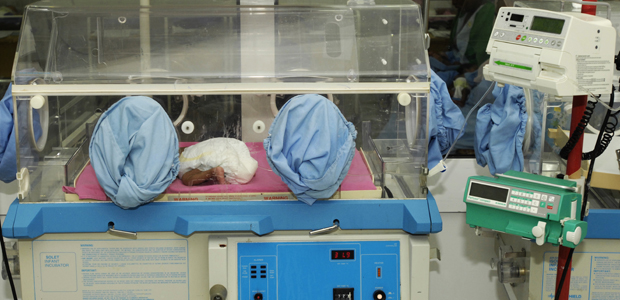Deep clean at Belfast’s Royal Maternity Hospital
A deep clean is being carried out in Belfast’s Royal Maternity Hospital’s neonatal room after three babies died from a bacterial infection.

Parents of 24 other babies tested for pseudomonas are waiting to see if their children have been infected – the results will not be available until Monday.
A Belfast Health and Social Care Trust spokesperson confirmed that all babies in the unit who may have been exposed to the infection, have been tested.
Health officials also revealed that four other babies had contracted pseudomonas: one is currently undergoing treatment, two have been treated and have already recovered, while the fourth made a recovery from pseudomonas but subsequently died of unrelated causes.
A spokeswoman for the Department of Health, Social Services and Public Safety (DHSSPS) said the baby still having treatment was doing well.
A different – and apparently unlinked – strain of the infection also claimed the life of another baby in Altnagelvin hospital in Londonderry last month, health officials said.
Other vulnerable babies have been swabbed for signs of the infection and a helpline has been set up for worried relatives as staff try and trace the source of the infection.
The large intensive care room at the Royal Maternity Hospital, which can take up to 13 babies, was cleared yesterday and the infants have been separated into small rooms.
In regard to the death in Derry in December, officials said the strain of the infection, which was subsequently eradicated within the hospital, was different from the one that has hit the Royal’s maternity unit and there was no evidence that the outbreaks were linked.
The bacteria can cause infections in the chest, blood and urinary tract.
‘Remain calm’
Stormont Health Minister Edwin Poots has received regular briefings from health officials as the situation developed.
“It is important that the parents and families of the babies affected are given all the support they require,” he said.
“I would also ask people to remain calm. The infection control team is now in the process of trying to identify the source of the infection and our health and social care system is in a good position to make sure all babies receive the neonatal care they require.
“I spent some time today with the doctors and nurses who work in the unit and I want to personally thank them again for all their hard work and dedication during this difficult period.”
He stressed that the neonatal unit is the only part of the hospital affected by the pseudomonas outbreak and the delivery wards and all other services at the Royal are operating as normal.
Expectant mothers should attend their appointments as scheduled, he added.
Pseudomonas is not itself infectious but because it exists in water or moisture patients can carry it on their skin. It can be treated with the right antibiotic but the third baby died despite the treatment.